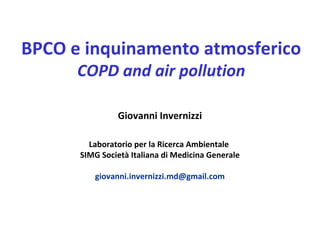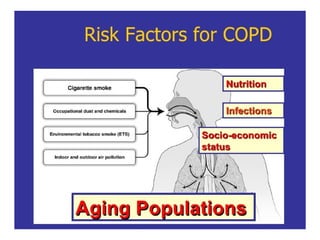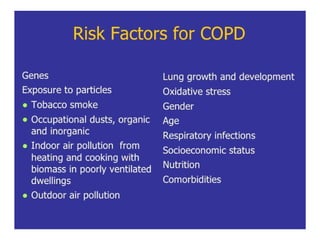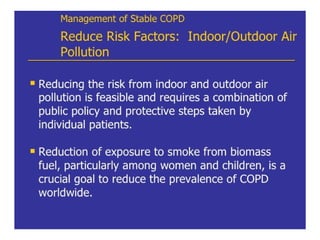Copd and pollution
- 1. BPCO e inquinamento atmosferico COPD and air pollution Giovanni Invernizzi Laboratorio per la Ricerca Ambientale SIMG Società Italiana di Medicina Generale giovanni.invernizzi.md@gmail.com
- 9. BPCO e inquinamento: la letteratura scientifica recente. COPD and pollution: an update.
- 10. Inquinamento e sviluppo dell’apparato respiratorio Pollution and lung development Wright RJ, Brunst KJ. Programming of respiratory health in childhood: influence of outdoor air pollution. Curr Opin Pediatr.2013 Air pollutants may impact anatomy and/or physiological functioning of the lung and interrelated systems. Programming effects may result from pollutant-induced shifts in a number of molecular, cellular, and physiological states and their interacting systems. Specific key regulatory systems susceptible to programming may influence lung development and vulnerability to respiratory diseases, including both central and peripheral components of neuroendocrine pathways and autonomic nervous system (ANS) functioning which, in turn, influence the immune system. Starting in utero, environmental factors, including air pollutants, may permanently organize these systems toward trajectories of enhanced pediatric (e.g., asthma, allergy) as well as adult disease risk (e.g., chronic obstructive pulmonary disease). Evidence supports a central role of oxidative stress in the toxic effects of air pollution. Additional research suggests xenobiotic metabolism and subcellular components, such as mitochondria are targets of ambient air pollution and play a role in asthma and allergy programming. Mechanisms operating at the level of the placenta are being elucidated. Epigenetic mechanisms may be at the roots of adaptive developmental programming. Optimal coordinated functioning of many complex processes and their networks of interaction are necessary for normal lung development and the maintenance of respiratory health. Outdoor air pollution may play an important role in early programming of respiratory health and is Potentially amenable to intervention.
- 11. L’inquinamento atmosferico è causa di BPCO? Occorrono studi più approfonditi per una conferma, ma… Is pollution a definte cause of COPD? More studies are needed. However… Schikowski T, et al. Ambient air pollution- a cause for COPD? Eur Respir J.2013 The role of ambient air pollution in the development of chronic obstructive pulmonary disease (COPD) is considered to be uncertain. We review the evidence in the light of recent studies.Eight morbidity and six mortality studies were identified. These were heterogeneous in design, characterization of exposure to air pollution, and methods of outcome definition. Six morbidity studies with objectively defined COPD (FEV1/FVC ratio) were cross-sectional analyses. Most studies were based on within communities exposure contrasts which mainly assess traffic related air pollution. Overall, evidence of chronic effects of air pollution on the prevalence and incidence of COPD among adults was suggestive but not conclusive despite plausible biologic mechanisms and good evidence that air pollution affects lung development in childhood and triggers exacerbations in COPD patients. To fully integrate this evidence in the assessment, the life-time course of COPD should be better defined. Larger studies with longer follow-up periods, specific definitions of COPD phenotypes, and more refined and source-specific exposure assessments are needed.
- 12. …ma è confermato che l’inquinamento atmosferico è fattore di rischio per di riacutizzazioni e mortalità nella BPCO. …pollution is a definite cause of COPD exhacerbations. Gan WQ et. al. Associations of Ambient Air Pollution with Chronic Obstructive Pulmonary Disease Hospitalization and Mortality. Am J Respir Crit Care Med 2013 BACKGROUND. Ambient air pollution has been suggested as a risk factor for chronic obstructive pulmonary disease (COPD). However, there is a lack of longitudinal studies to support this assertion. AIMS: To investigate the associations of long-term exposure to elevated traffic-related air pollution and woodsmoke pollution with the risk of COPD hospitalization and mortality. METHODS: This population-based cohort study included a 5-year exposure period and a 4-year follow-up period. All residents aged 45-85 years who resided in Metropolitan Vancouver, Canada, during the exposure period and did not have known COPD at baseline were included in this study (N = 467,994). Residential exposures to traffic-related air pollutants (black carbon, particulate matter < 2.5 µm in aerodynamic diameter, nitrogen dioxide, and nitric oxide) and woodsmoke were estimated using land-use regression models and integrating changes in residences during the exposure period. COPD hospitalizations and deaths during the follow-up period were identified from provincial hospitalization and death registration databases. MEASUREMENTS AND MAIN RESULTS: An interquartile range elevation in black carbon concentrations (0.97×10 5/m, equivalent to 0.78 µg/m3 elemental carbon) was associated with a 6% (95% confidence interval, 2-10%) increase in COPD hospitalizations and a 7% (0-13%) increase inCOPD mortality after adjustment for covariates. Exposure to higher levels of woodsmoke pollution (tertile 3 versus tertile 1) was associated with a 15% (2-29%) increase in COPD hospitalizations. There were positive exposure-response trends For these observed associations. CONCLUSIONS: Ambient air pollution, including traffic-related fine particulate pollution and woodsmoke pollution, is associated with an increased risk of COPD.
- 13. L’inquinamento atmosferico è fattore di rischio per di riacutizzazioni nella BPCO: una conferma italiana. Pollution is a definite cause of COPD exhacerbations: an Italian confirmation Eur Respir J. 2013 Jan 11. [Epub ahead of print] Air pollution and multiple acute respiratory outcomes. Faustini A et al. on behalf of the EPIAIR collaborative Group Regional Health Service, Lazio Region, Rome, Italy. Short-term effects of air pollutants on respiratory mortality and morbidity have been consistently reported but usually studied separately.To more completely assess air pollution effects, we studied hospitalisations for respiratory diseases together with out-of hospital respiratory deaths. A "time stratified" case-crossover study was carried out in six Italian cities from 2001-2005. Associations between daily particulate matter (PM10) and nitrogen dioxide (NO2) and hospitalisations for respiratory diseases (n. 100,690), chronic obstructive pulmonary disease (COPD) (n. 38,577), lower respiratory tract infections (LRTI) among COPD patients (n. 9,886) and out-of hospital respiratory deaths (n 5,490) were estimated for 35+year-old residents. For 10 μg·m(-3) PM10, we found an immediate 0.59% (lag 0-1) increase in hospitalisations for respiratory diseases and a 0.67% increase for COPD; the 1.91% increase in LRTI hospitalisations lasted longer (lag 0-3) and the 3.95% increase in respiratory mortality lasted six days. Effects of NO2 were stronger and lasted longer (lag 0-5). Age, gender, and previous ischemic heart disease acted as effect modifiers for different outcomes. Analysing multiple more than single respiratory events shows stronger air pollution effects. The temporal relationship between the pollutants' increases and hospitalizations or mortality for respiratory diseases differs.
- 14. Groneberg DA, Chung KF Models of chronic obstructive pulmonary disease Respiratory Res, 2004, 5:18
- 15. Groneberg DA, Chung KF Models of chronic obstructive pulmonary disease Respiratory Res, 2004, 5:18
- 16. Come ridurre l’esposizione all’inquinamento How to reduce exposure • conoscere le situazioni di rischio espositivo •stay informed about sources • evitare il fumo passivo • avoid second-hand smoke • in casa at home • in auto inside car • all’aperto outdoors luoghi di svago ad alta frequenza di fumatori (centri storici, stadi) crowded leisure places (historical centers, stadium) • informarsi sulla qualità dell’aria outdoor • dati ARPA (previsioni/tempo reale) • stay informed on pollution real time data and forecasts (EPA website)
- 17. Attenzione: le sigarette producono più PM di un motore diesel di ultima generazione! Beware: cigarettes produce much more particles than a diesel engine! PM production from ETS (e) and an ecodiesel engine (d) 3 (three smoldering cigarettes or an idling engine for 30' in a 60m garage) PM1e 700 PM2.5e 600 PM10e PM 1d 500 Starting smoldering cigarettes PM 2.5d or idling diesel engine PM μg/m 3 400 PM 10d 300 200 Background 100 0 2 6 10 14 18 22 26 30 34 38 42 46 50 54 58 62 66 70 74 78 82 86 90 94 98 102 106 110 114 118 122 Time (min) Invernizzi G, et al. Tobacco Control , 2004.
- 18. L’inquinamento da fumo passivo in auto Smoking pollution inside cars. Results 2. Tr anspor t at ions.1 Smoking in the car exposes to huge PM concentrations. Invernizzi G, Ruprecht A, Boffi R, et al. Real-time measurement of particulate matter produced by environmental tobacco smoke: a new way to monitor indoor air quality. Am J Crit Care Med 2003; 167: A500
- 19. L’inquinamento outdoor da fumo passivo Outdoor second-hand smoke pollution High traffic road Car-free road
- 20. Results • A total of 1396 smokers were counted in Fiorichiari street during the “Promenade time” (20.00 p.m. - 02.00 a.m.) • A total of 2513 cars crossed Pontaccio Street in the same time-window
- 21. Durante le ore di maggior afflusso di visitatori la qualità dell’aria è molto peggiore nella zona pedonale rispetto all’adiacente via molto trafficata During the promenade hours air quality is worse in car-free zone due to SHS PM1 Comparison between Fiorichiari (car free) and Pontaccio Street (open to car traffic) on Saturday night Fiorichiari St. Pontaccio St. 4,0 FIORICHIARI PM1 CROSSOVER PONTACCIO'S 3,5 3,0 micrograms per m3 2,5 2,0 1,5 1,0 0,5 0,0 12.01 14.01 16.01 18.02 20.02 22.02 13.01 15.01 17.01 19.02 21.02 23.02 0.03 1.03 2.03 3.03 4.03 5.03 6.03 7.04 8.04 9.04 10.04 11.04 time 10 hours Mean excess PM1 1.1 mcg/m3
- 22. La qualità dell’aria allo stadio di San Siro peggiorava notevolmente durante gli eventi sportivi rispetto all’esterno a causa del fumo passivo (80.000 circa le sigarette fumate durante Inter-Lazio 2011). Air quality worsened inside the San Siro stadium due to the 80.000 sigarettes smoked during the Inter vs Lazio match, srping2011.
- 23. L’inquinamento da fumo nello stadio di San Siro: le concentrazioni di nicotina ambientale dentro e fuori lo stadio. Airborn nicotine concentration in- and outside the stadium. 4 .0 C o m p a r is o n N ic o t in e in s id e /o u ts id e 3 .4 3 N ic o tin e in s id e th e S ta d iu m N ic o tin e o u ts id e th e S ta d iu m 3 .5 3 .0 2 .8 8 m ic r o g r a m s p e r m 3 2 .5 2 .0 1 .5 1 .3 2 1 .0 0 .5 1 0 .5 0 .1 8 0 .1 6 0 .0 8 0 .0 7 0 .0 H o u r b e fo re g a m e I° tim e II° tim e H o u r a fte r g a m e
- 24. L’inquinamento da fumo nello stadio di San Siro: le concentrazioni di nicotina ambientale dentro e fuori lo stadio. Airborn nicotine concentration in- and outside the stadium. C O N F R O N T O N IC O T IN A IN T E R N O /E S T E R N O 4 .0 3 .4 3 N ic o tin a In te r n o N ic o tin a e s te r n o 3 .5 2 .8 8 3 .0 m ic r o g r a m m i p e r m 3 2 .5 2 .0 1 .3 2 1 .5 1 .0 0 .5 1 0 .5 0 .1 8 0 .1 6 0 .0 8 0 .0 7 0 .0 n e ll'o r a p r im a d e lla p a r t it a I° te m p o II° te m p o n e ll'o r a d o p o la p a r t it a
- 25. L’inquinamento da fumo nello stadio di: le concentrazioni di PM2.5. PM2.5 concentrations in- and outside the stadium
- 27. Come ridurre l’inquinamento outdoor. How to mitigate outdoor pollution Gli interventi di limitazione del traffico: l’esperienza di Milano (Ecopass, Area C). The Milan LEZ (low emission zone)
- 28. Area C monitoring campaign, July 2010. Fixed monitoring stations: 1-7.
- 29. Dane Westerdahl and Giovanni Invernizzi at the black carbon monitoring site in Duomo Square pedestrian zone, Milan, Italy, July 2010. 22
- 30. 30 % BC in PM10 in the different zones Pedestrian zone Ecopass zone No restrictions zone 25 25.3 24.7 22.6 20 % BC in PM10 17.7 15 13.2 12.6 11.8 10 9.8 9.6 8.5 7.8 7.9 5 0 I° test II° test III° test Mean of the three tests Percentuali di BC / PM10 nelle zone a diversa viabilità nelle tre giornate di monitoraggio, e media delle tre giornate. La riduzione della % di BC nel PM10 in Aera C è stata del 47%,in zona Duomo del 62%. Black carbon reduction inside the LEZ was 47%, in the car-free zone was 62%.
- 31. AIR quality index: a reference to understand exposure risk. EPA's Air Quality Index (AQI) for Particulate Matter 2.5 (PM 2.5) and Ozone (8-Hr)
- 32. Credits ARIO RUPRECHT Laboratorio di Ricerca Ambientale SIMG, Milano DANE WESTERDAHL Cornell University, Ithaca, NY COSTANTINOS SIOUTAS University of Southern California, LA NINO KUENZLI Basel Institute for Social Preventive Medicine













![L’inquinamento atmosferico è fattore di rischio per di
riacutizzazioni nella BPCO: una conferma italiana.
Pollution is a definite cause of COPD exhacerbations: an Italian confirmation
Eur Respir J. 2013 Jan 11. [Epub ahead of print]
Air pollution and multiple acute respiratory outcomes.
Faustini A et al. on behalf of the EPIAIR collaborative Group Regional Health Service, Lazio Region,
Rome, Italy.
Short-term effects of air pollutants on respiratory mortality and morbidity have been consistently
reported but usually studied separately.To more completely assess air pollution effects, we studied
hospitalisations for respiratory diseases together with out-of hospital respiratory deaths. A "time
stratified" case-crossover study was carried out in six Italian cities from 2001-2005.
Associations between daily particulate matter (PM10) and nitrogen dioxide (NO2) and
hospitalisations for respiratory diseases (n. 100,690), chronic obstructive pulmonary disease (COPD)
(n. 38,577), lower respiratory tract infections (LRTI) among COPD patients (n. 9,886) and out-of
hospital respiratory deaths (n 5,490) were estimated for 35+year-old residents.
For 10 μg·m(-3) PM10, we found an immediate 0.59% (lag 0-1) increase in hospitalisations for
respiratory diseases and a 0.67% increase for COPD; the 1.91% increase in LRTI hospitalisations
lasted longer (lag 0-3) and the 3.95% increase in respiratory mortality lasted six days.
Effects of NO2 were stronger and lasted longer (lag 0-5).
Age, gender, and previous ischemic heart disease acted as effect modifiers for different outcomes.
Analysing multiple more than single respiratory events shows stronger air pollution effects.
The temporal relationship between the pollutants' increases and hospitalizations or mortality for
respiratory diseases differs.](https://image.slidesharecdn.com/copdandpollution-130315045736-phpapp01/85/Copd-and-pollution-13-320.jpg)


















